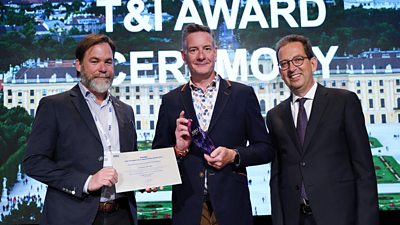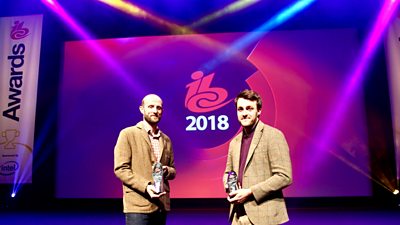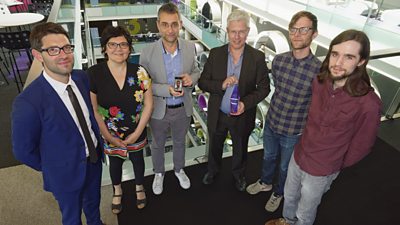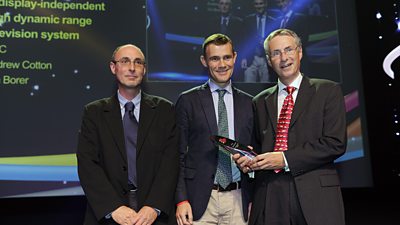2020s
- Hybrid Log Gamma (HLG)
Television Academy Engineering Committee 2023
The Hybrid Log Gamma (HLG) system for High Dynamic Range (HDR), co-developed by �鶹Լ�� R&D and Japanese broadcaster NHK, won an Engineering, Science & Technology Emmy® Award, as part of the international standard – the international standard for high dynamic range television production and international programme exchange. Read more in Andrew Cotton's blog.

European Broadcasting Union 2023
The �鶹Լ��’s innovative use of private 5G networks for won a prestigious EBU Technology & Innovation award; beating 23 entries from broadcasters from across Europe. This work was a collaborative effort between �鶹Լ�� R&D, �鶹Լ�� News, �鶹Լ�� Technology Group and industry partners Neutral Wireless.

IBC 2023
The Coronation trial was also gifted two awards at the 2023 IBC show - the same team picked up the Content Creation Innovation Award and the paper authors received the Best Technical Paper award with praise:
For their work on deploying a 5G standalone non-public network at the coronation of King Charles III, Mark Waddell, Ian Wagdin, David Butler (�鶹Լ��), Sam Yoffe, Kenny Barlee, Douglas Allan, Malcolm Brew, and Robert Stewart (University of Strathclyde and Neutral Wireless) will receive the Best Technical Paper Award. The committee and IET found the paper to be exceptionally well-written and materially relevant to the media industry, sharing valuable technical insight."
IBC 2023
KM Stott prize for excellence
University of York 2023
Dr Daniel Turner received the University of York’s KM Stott prize for excellence in scientific research for his thesis, “An Investigation into the Application of Machine Learning to Spatial Audio for Immersive Media”. Daniel’s research was done in collaboration with �鶹Լ�� R&D’s Audio Team.
ACM Multimedia Systems 2023
R&D’s Piers O’Hanlon and co-author Adil Aslam won the “DASH-IF Excellence in DASH” award at the 2023 ACM Multimedia Systems (MMSys) conference. Their award-winning paper, on the performance of using the DASH.js player in low latency streaming, beat several other papers on media streaming topics; and was subsequently republished as an R&D White Paper.
AMD Xilinx award
AMD Xilinx 2023
�鶹Լ�� R&D’s low latency 5G contribution video encoder, based on AMD’s Xilinx Kria platform, won a ‘Best Partner demo’ award from AMD Xilinx. The demo was shown by our partner, Neutral Wireless, at the 2023 NAB conference.
3rd Generation Partnership Project (3GPP) 2023
Richard Bradbury received an award at the 124th meeting of for his contribution to the group’s work over the last year.
Anthem Awards -
Anthem Awards (by The Webby Awards) 2023
The ‘50:50 Music Monitor’ tool developed by R&D’s Oscar Schafer won the category at the Anthem Awards. The tool was created to help radio production teams monitor the gender balance of music output.
OpenUK award for Software
OpenUK 2022
R&D won an award for software, in recognition of our wide-ranging use of open source and open standards.
Broadcast Tech & Innovation Award for 'Best Innovation' - 5G trial at Commonwealth Games
Broadcast 2022
�鶹Լ�� R&D (with industry partners Vislink and BT) won at the Broadcast Tech and Innovation Awards 2022, for its trial deployment of private 5G networks at the 2022 Commonwealth Games.
AES - Best Technical Paper
AES 2022
Ian McClenaghan, Lawrence Pardoe (�鶹Լ�� R&D) and Lauren Ward (Univesity of York) received the Best Technical Paper prize at the 2022 AES Europe Convention. Their paper, “” covered work carried out during Iain’s recent graduate project with R&D's audio team.
TVNewsCheck 2022
R&D’s Judy Parnall received TVNewsCheck's 'Women in Technology Leadership Award' at the NAB conference, alongside the joint winner, Sharri Berg of Fox. Judy was also profiled in an interview with TVNewsCheck, reflecting on her career, including becoming the EBU Technical Assembly's first female chair.
SourceForge Open Sourcing awards
SourceForge 2022
Two of R&D’s long-standing open source projects, the ‘Dream Digital Radio Mondiale’ software receiver and the MXF/AAF media file toolkit, received the ‘Community Leader’ and ‘Open Source Excellence’ awards from the open source platform SourceForge.
ETSI 2022
R&D's Lindsay Cornell was awarded the 2022 award, that "rewards individuals who have made an outstanding personal contribution to ETSI, to building the work of ETSI, or raising its reputation in specific sectors of standardization."
Fabio Neri Best Paper Award - IP networking
Elsevier 2021
Dr Adam Funnell's paper, , won the '2020 Fabio Neri Best Paper Award' in Elsevier Journal of Optical Switching and Networking.
The paper was co-authored with David Butler (�鶹Լ�� R&D) and Georgios Zervas (UCL), whilst Adam was carrying out a supervised research project in �鶹Լ�� R&D.
Technology & Engineering Emmy Awards 2021
R&D's Phil Tudor received a Technical Emmy for his work on AAF (Advanced Authoring Form), alongside partners the AAF Association (AMWA), Avid Technology and the European Broadcasting Union (EBU).
ACM - Recognition of Excellence award
ACM 2021
Vinoba Vinayagamoorthy won an ACM 'Recognition of Excellent Service' award for her work organising the IMX conference, as well as for improving and promoting diversity and inclusion.
Classical Music Digital Awards 2021
Pick A Part, R&D's collaboration with �鶹Լ�� Philharmonic, received a 'highly commended' nod from Classical Music Digital Awards 2020, as ""..
SMPTE Fellowship - Andrew Cotton
SMPTE 2021
Andrew Cotton was awarded a SMPTE Fellowship at an , during their Annual Technical Conference.
SMPTE 2021
Awarded to Nick Wells in recognition of a long career at the �鶹Լ��, developing solutions dependent on a deep understanding of digital signal processing, including DPCM-based video compression, sampling of PAL and NTSC TV signals, the lossless re-coding of MPEG2 signals and helping to develop the MXF format.
IADAS 2020
�鶹Լ�� Virtual Reality experience was produced for the �鶹Լ�� by Passion Pictures in collaboration with �鶹Լ�� VR Hub, Drama Production (Wales) and R&D's David Johnston (�鶹Լ�� Reality Labs).
2010s
Mediatel 2019
Our live UHD streaming trial at the Wimbledon and the 2018 World Cup won this silver award.

What Hi-Fi 2018
This year's Summer of Sport UHD trials at the World Cup and Wimbledon earned us What Hi-Fi magazine's award for developments in audio and video.

IBC 2018
�鶹Լ�� R&D won two awards at the 2018 show - our work on Artificial Intelligence in Production picked up the award for Best Paper conference paper for their publication on a prototype system for covering video streaming live events.
We also received a second award, shared with the for our work on our Civilisations AR app which accompanied the �鶹Լ�� Two series, and the Hub's Damning the Nile experience.

EBU 2018
Our audio research team were part of a collaboration which won the EBU's Technology and Innovation award for an Audio Definition Model Renderer - a data model for describing audio experiences which can be thought of as a file format for storing next-generation audio content.
IEEE 2017
�鶹Լ�� R&D's video coding team were part of an H.265/HEVC verification group which received the IEEE Transactions on Circuits and Systems for Video Technology for the paper “Video Quality Evaluation Methodology and Verification Testing of HEVC Compression Performance”.
TVB Europe 2016
The team behind .

IBC 2015
Tim Borer and Andrew Cotton were awarded Best Conference Paper at IBC for their paper "".
Digital TV Group 2015
The Collaboration Award, for companies that put aside commercial differences to succeed together, was given to Phil Layton’s team for their collaborative efforts both in the UK and worldwide.
Queen's Award for Enterprise 2011
The Production Magic team at �鶹Լ�� R&D has been working on new techniques and applications of computer-based image processing for TV production for many years. Some of this work was recognised in the form of a Queen’s Award for Enterprise in the "Innovation" category, for their contribution to the Piero sports graphics system.
Royal Television Society 2010
Tony Churnside was awarded RTS Young Technologist of the Year for his work in ambisonics, creating 3D audio mixes, and accessibility. The award enabled him to attend IBC.
2000s
RTS “Raising The Bar” Award for Ingex
Royal Television Society 2009
Phil Tudor led the team that received the award for Ingex, Automated Tapeless Production.
The Ingex system brings the huge advantages of tapeless production to multicamera programme making. Controlled from the production gallery, the system records all the studio feeds and stores them directly to disk.
Royal Television Society 2009
�鶹Լ�� R&D won for DVB-T2 (Freeview HD) - the new terrestrial standard for Digital Video Broadcasting which enables HD on Freeview - which "will transform the viewing experience of millions... and keeps Britain in the forefront of the digital revolution"
IBC 2006
Piero is a system for generating virtual views of sporting events and adding 'tied-to-pitch' graphics. Piero won the IBC Innovation Award for Innovative Application of Technology in Content Creation www.ibc.org, as well as the Cable and Satellite Product of the Year Award for Best Outside Broadcast Technology or Service.
Royal Television Society 2005
A Lifetime Achievement award was presented to Chris Clarke of the �鶹Լ��’s Research & Development Department. At the Royal Television Society’s Technology Awards. In the 1970s Chris' work on digital PAL decoding and on TV standards conversion made possible a worldwide agreement on digital video standards. In the 1990s Chris led the team at �鶹Լ�� R&D that made the first DTT transmitter and receiver.
Development Team Award to �鶹Լ�� R&D's Interactive Services Team
Royal Television Society 2005
The 2005 RTS Research and Development Team Award was awarded to �鶹Լ�� R&D's Interactive Services Team. The Team, led by Jeff Hunter, received their award at the awards ceremony held on Thursday, 8th December at Bafta in London.
RTS Judges Award for R&D's election graphics
Royal Television Society 2005
The RTS is a major force in broadcasting in the UK. It recognises excellence in all the disciplines of broadcasting. Of special relevance to �鶹Լ�� R&D are the technical awards, frequently announced at the time of the annual Shonberg lecture.
IBC Conference Award Technical Papers: the excellence prize
IBC 2005
This prize was awarded to Adam Wiewiorka and Peter Moss from �鶹Լ�� R&D Department for their paper 'Digital on-channel repeater for DAB'. The on-channel repeater retransmits a signal on the same frequency as it receives, so that no frequency translation is required, as is the case in traditional rebroadcast or retransmission system.
Royal Television Society 2004
The Royal Television Society's Technical Innovation Awards 2004 were presented on Monday, 1 November 2004 at the Cavendish Conference Centre in London. The RTS Technical Award Jury elected the Pro-MPEG Forum as the winner of the Judges' Award, for its 'outstanding contribution to the advancement of digital broadcasting'. Nick Wells, chairman of the Forum and Jim Wilkinson, one of the principal architects of the MXF format, were present to receive the award which was presented by David Lowen, honorary secretary of the RTS.
Jeff Hunter wins the RTS Young Person's Technology Award
Royal Television Society 2002
�鶹Լ�� Research & Development Department's Jeff Hunter has been awarded the Royal Television Society London Centre's Young Person's Technology Award for his major contribution to the development of Interactive Television systems for the �鶹Լ��'s digital television services on all delivery platforms.
Queen's Award for Enterprise 2001
�鶹Լ�� Research & Development and LSI Logic, a leading designer and manufacturer of communications and storage semiconductors, have received the highly prestigious Queen's Award for Industry in the category of Innovation for a jointly developed single-chip digital terrestrial television (DTT) demodulator.
Royal Television Society 2001
Cutting edge radio camera technology developed in-house is set to transform programme making and pave the way for the cordless studio. In a world first, a team in �鶹Լ�� R&D has developed a lightweight box containing a transmitter chip that can be attached to the back of digital cameras, enabling them to work without cables.
Prototypes of the equipment, which won the Royal Television Society award for technical innovation, have been tried in parts of the �鶹Լ��. R&D is now working with manufacturer Gigawave on developing the model for the commercial market.
Royal Television Society 2001
A team from Spectrum Planning Group, �鶹Լ�� Research & Development were recognised for their work on digital television on Saturday, 20 October at the RTS Southern Centre Awards. The team, based at Kingswood Warren, shared the Best Engineering Innovation award with their partners in the Joint Frequency Planning Project.
The award recognised the work put into 'multiplex coverage equalisation', a vast piece of work which attempts to re-plan the frequencies used by digital terrestrial television, with the goal of improving the coverage of the UK network without using any more sites.
Emmy 2001
The �鶹Լ�� has been awarded a prestigious Emmy by the National Academy of Television Arts & Sciences for "outstanding achievement in technological advancement".
Presented at a Gala ceremony at the Marriott Marquis Hotel in New York City, the award recognises the pioneering work of the �鶹Լ��'s Research & Development department in the late 1980's on high-definition up-conversion, a process which enables broadcasters to convert programmes made in standard definition format to the new high-definition format which is being increasingly used, especially in the United States.
RTS Award for the contribution to the development of digital terrestrial television
Royal Television Society 2000
This year the RTS Judges’ Award for technical innovation was given to the �鶹Լ�� DTT technical team for their contribution to the development of digital terrestrial television.
The �鶹Լ�� took the lead in developing the technology for digital television to guarantee that it could deliver public service programmes to the widest possible audience. The work was carried out by a team working mainly at �鶹Լ�� R&D, but which included others in many �鶹Լ�� Departments.
RTS Innovative Applications Award for Assisted Subtitling
Royal Television Society 2000
Assisted Subtitling won the RTS Award for Innovative Applications. We were joint recipients along with �鶹Լ�� Subtitling, 20/20 Speech Ltd., and Softel Ltd. The project embraced fundamental research and showed how it could be applied to real problems and lead to real products in the market.
Both 20/20 Speech Ltd, and Softel Ltd were involved in the project, developing a system which combines together text analysis, speech recognition, shot change detection and other techniques to help in the preparation of subtitles.
Royal Television Society 2000
Justin Mitchell, 28, led the �鶹Լ�� Research and Development team that designed the prototype receiver chips for digital terrestrial television set-top boxes. Launched in April 1998, the chips set the industry standard, becoming the market leader for consumer and professional use.
IBC 2000
The award recognised John Sykes’ outstanding contribution to the development of digital broadcasting in Britain and around the world. Sykes, who is head of Transmission Systems Group, R&D, has been at the forefront of the development of digital television and radio since their beginnings in the 1980s, working with international bodies on standards for both analogue and digital technology.
1990s
IEE's JJ Thomson Memorial Prize for MPEG-2 video compression paper
IEE 1999
Phil Tudor has won the IEE's JJ Thomson Memorial Prize. This award is in recognition of his paper on 'MPEG-2 video compression' which was published in the December 1995 issue of the IEE's Electrical and Communications Engineering Journal.
The paper gives a comprehensive overview of the techniques involved in MPEG-2 video compression, the type of compression to be used in the �鶹Լ��'s digital television services. This paper is the pinnacle of the wide range of information about MPEG-2 video compression available from Kingswood Warren.
Best television presentation of a stage dance at "Dance Screen 99"
Award 1999
A �鶹Լ��/Playback HD production won the award for best television presentation of a stage dance at "Dance Screen 99" in Cologne recently. �鶹Լ�� R&D provided technical facilities for this event. The HD production of "A Midsummer Night's Dream" was voted best in a category where more than 100 programmes competed. It was given a special showing in HD using one of the best cinema HD projectors available (although delegates voted on the basis of VHS copies viewed in a special room).
IBC 1999
�鶹Լ�� R&D and Playback HD won the IBC Award for Achievement in Acquisition for the making of "Cecilia and Bryn at Glyndebourne" in HD.
Italian mezzo-soprano Cecilia Bartoli and bass-baritone Bryn Terfel gave a concert at Glyndebourne opera house, with the London Philharmonic Orchestra, conducted by Myung-Whyn Chung. The �鶹Լ�� and Playback HD decided to make "Cecilia and Bryn at Glyndebourne" in 1250-line HD to celebrate the event's significance.
IBC Award for the DTT Mobile Service
IBC 1999
Jointly with our MOTIVATE partners we won the IBC Award for the DTT Mobile Service. At IBC '99 our MOTIVATE partners Nozema, Deutsche Telekom and NDS, equipped a tram route between the central station and the RAI centre with a mobile DVB-T receiver, demonstrating the effectiveness of the DVB-T technology in a mobile environment.
IBC Award for Acquisition Technology
IBC 1999
�鶹Լ�� R&D with �鶹Լ�� Smart Productions won the IBC Award for Acquisition Technology. �鶹Լ�� R&D won this award for its novel approach to multi-camera, cable-free programme acquisition.
The judges applauded this clever approach to acquisition for making a wide range of benefits available to producers at a manageable cost. These include reduced crew sizes, shorter rigging time, innovative new camera positions and general improvements in safety.
IBC 1999
The �鶹Լ�� won the IBC Launch of the Year award for its commitment to new technology. In addition to the launch of core services �鶹Լ�� 1 and �鶹Լ�� 2, on DSat and DTT, the corporation also launched innovative new channels such as �鶹Լ�� Choice, �鶹Լ�� Knowledge, �鶹Լ�� News 24 and �鶹Լ�� Parliament.
As a public service broadcaster, it was important for it to ensure a new technical architecture was devised that could support the �鶹Լ��'s commitment to digital at a regional level. It was also vital that the �鶹Լ��'s news and information support services were upgraded for the advent of digital. As a result, the �鶹Լ�� introduced the world's first MHEG-based Digital Text service as a successor to Teletext.
Emmy 1999
Nearly 30 years after its completion, the �鶹Լ��'s sound distribution technology, Sound in Syncs, has won an Emmy. Three of the engineers who worked on the project in the late 1960s -- the department's head of Business and Engineering, John Astle, and former Kingswood Warren colleagues Chris Dalton and Colin Spicer -- collected the prized trophy at a ceremony in New York.
Sound in Syncs (SiS) -- the digital television sound transmission system used between studios and transmitters -- was in �鶹Լ�� service for more than 15 years from 1970 and adopted by many other broadcasters. It enabled sound and picture signals to be combined. It revolutionised the distribution of television sound across national and international networks.
Queen's Award for the development of a standards converter
Queen's Award for Enterprise 1998
The �鶹Լ�� has been awarded its sixth Queen's Award to Industry for Technical Innovation. Awarded jointly with Snell & Wilcox Ltd, the award was granted for the development of a standards converter -- a technology that has contributed to the exchange of television programmes between Europe and the US.
Royal Television Society 1998
At the Royal Television Society Technical Innovation Awards ceremony, held at BAFTA in London on Monday 9th November, the �鶹Լ�� won the Innovative Application Award for its "free-d" camera tracking system. This system, which recently won the "Most Innovative Achievement in Production" award at IBC '98, is a new way of measuring the position and orientation of a camera, for use with Virtual Production systems. Unlike other systems, it places no constraints on camera mountings or scene content, and can be used in very large studios. The system has been licensed to Radamec Broadcast Systems.
IBC Audio R&D Engineer of the Year Award
IBC 1998
David Kirby won the IBC Audio R&D Engineer of the Year Award for being a major influence in audio engineering for more than a decade.
Having started work on audio editing systems, Kirby moved on to assess the use of multichannel sound in broadcasting. Later, he co-ordinated tests which led to the acceptance of MPEG Advanced Audio Coding as a new international standard.
IBC Video R&D Engineer of the Year Award
IBC 1998
Mike Knee and Snell & Wilcox shared the IBC Video R&D Engineer of the Year Award.
The judges found it impossible to split two entries which were for contributions to the same field of activity. Nick Wells and Mike Knee's work were both concerned with ways to prevent quality loss caused by the cascading of compression processing.
IBC Virtual Studio Award
IBC 1998
�鶹Լ�� shared the IBC Virtual Studio Award with �鶹Լ�� Resources for being pioneers in virtual production.
This year's award for production innovation recognised two particular developments: Free-d and Truematte. Free-d is a way of measuring the position and orientation of a camera in a large studio without interfering with normal operations. Truematte is a new reflective background cloth for chromakey which eliminates the problems of colour spill and the need for uniform bright lighting.
RTS Award for the MOLE
Royal Television Society 1997
The Royal Television Society research and development award for 1997 has been won by the MOLE™ entered jointly by �鶹Լ�� Research & Development and Snell & Wilcox.
The MOLE™ is an invention within the ATLANTIC Project to facilitate cascaded MPEG audio and video decoding and recoding.
IBC Editor's Award For Technological Achievement
IBC 1997
Rhys Lewis won the IBC Editor's Award for Technological Achievement for developing Digital Terrestrial TV.
Lewis played a major role in developing and improving DAB broadcast network interfaces, and was instrumental in developing the now universal DAB Ensemble Transport Interface (ETI). He also led the �鶹Լ�� team which developed the first practical DAB signal distribution system using switched telecommunications circuits - followed by leadership of ETSI's ETI project team.
IBC Editor's Award For Technological Achievement
IBC 1997
The �鶹Լ�� won the IBC Editor's Award for Technological Achievement for its trial network in Newcastle and London.
Using �鶹Լ�� R&D-designed DVB-T COFDM modulators and demodulators, the �鶹Լ�� trial network has been tested with ATM links and cross-strapped streams via (DVB-S) satellites that downlinked to terrestrial transmitters for re-broadcast with regional opt-ins. DVB was a splendid example of pan-industry collaboration, but it takes guts and money to actually build and test the stuff.
Emmy Outstanding Achievement in Technological Development Award
Emmy 1997
�鶹Լ�� R&D received an award for Outstanding Achievement in Technological Development from the National Academy of Television Arts and Sciences, otherwise known as the Engineering Emmy for our work on motion detection in digital television processing.
Emmy Award for Digital Technology
Emmy 1996
The �鶹Լ�� won this Emmy for work carried out in the 1980s on the error feedback system for reducing unwanted quantisation effects in limited accuracy digital signal processing.
IBC International Broadcast & Television Buyer Award
IBC 1994
R&D won the International Broadcast & Television Buyer Award for "the most innovative transmission solution" for its work on the high power London DAB Experiment.
Queen's Award for NICAM 728
Queen's Award for Enterprise 1992
In April of 1992 �鶹Լ�� Engineering received the Queen's Award for Technological Achievement, in recognition of the Research Department's development of the NICAM 728 digital stereo sound system for television.
NICAM 728 was first introduced to the public (on an experimental basis) in the summer of 1986. In September 1986 the NICAM specification was accepted by the government as the UK standard, and the following year was recommended by the EBU as the European standard for digital sound with television. In the UK the full service was introduced on the 31st of August 1991, and by 1992 was available to 78% of the population. Other countries who adopted the system included Norway, Sweden, Hong Kong, Denmark, Finland, Spain, Belgium, New Zealand, and Singapore.
1980s
What Hi-Fi Grand Prix for NICAM 728
Award 1989
�鶹Լ�� was awarded the "What Hi-Fi" Grand Prix for its digital stereo sound with television system NICAM 728.
Queen's Award for LF Radio Teleswitching
Queen's Award for Enterprise 1987
In April 1987 �鶹Լ�� Engineering received their fourth Queen's Award, on this occasion jointly with the Electricity Council, for their pioneering work in developing Radio Teleswitching.
Radio teleswitching was an offshoot of what, to broadcasters, was a much more important system - RDS. For a long time it was known that listeners to radio often had trouble finding their way around an analogue tuning dial, particularly on portable receivers and VHF-FM car radios. By 1988 the system was fully standardised and launched across the UK and Europe.
IBC 1984
Dr. Geoffrey Philips, Head of Radio Frequency Group, was presented with the first ever IBC Award at the International Broadcasting Convention, Brighton, in recognition of his acclaimed work over thirty years in fostering the efficient use of the radio spectrum.
Queen's Award for Teletext
Queen's Awards for Enterprise 1983
Queen's Award for Teletext (with the Independent Broadcasting Authority).
1970s
Queen's Award for Sound-in-Syncs
Queen's Awards for Enterprise 1974
Jointly awarded to Research and Designs department.
Geoffrey Parr Award for the Sound-in-Syncs system
Royal Television Society 1972
The Geoffrey Parr Award jointly to Dr. C.J. Dalton and J.R. Sanders for their work in developing the Sound-in-Syncs system.
1960s
Queen's Award for Field Store Standards Converter
Queen's Awards for Enterprise 1969
Jointly awarded to Research and Designs department.
Geoffrey Parr Award for outstanding work in the development of the field-store television standards converter
Royal Television Society 1969
The Geoffrey Parr Award was received by E.R. Rout and his team for outstanding work in the development of the field-store television standards converter.
Geoffrey Parr Award for inventing TARIF
Royal Television Society 1968
The Geoffrey Parr Award was received by C.B.B. Wood and his team for inventing TARIF - an electronic colour correction system for colour film.
Awarding bodies
-
Awarded in the USA by the Academy of Television, Arts and Sciences. These highly coveted trophies are given by our peers in recognition of outstanding creativity, diversity, innovation and excellence.
-
The International Broadcasting Convention and Conference has for many years recognised the excellence of engineers, researchers, scientists, and developers in the broadcasting industry.
-
The UK's most prestigious awards for business performance.
-
A major force in UK broadcasting in the UK, the award recognises excellence in all the disciplines of broadcasting.